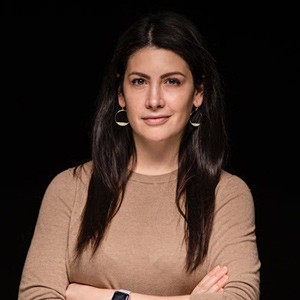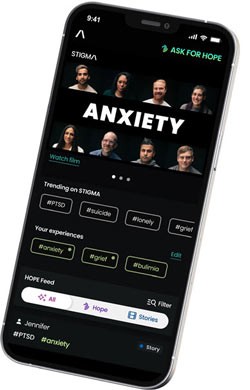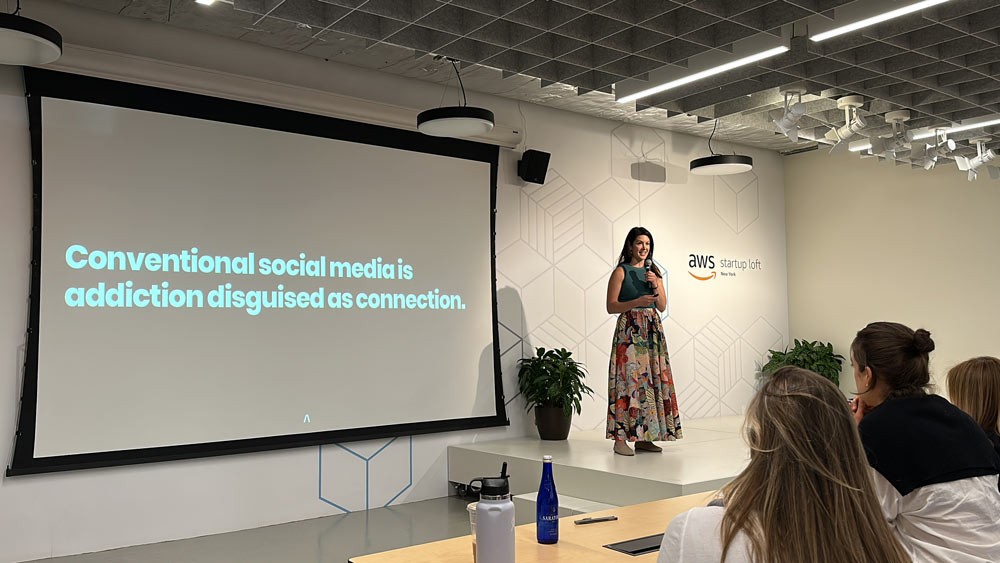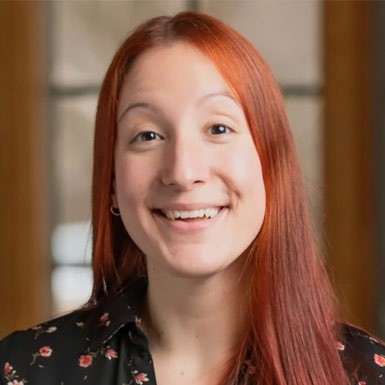How was this content?
How STIGMA scaled their hope delivery app with the AWS Impact Accelerator

Many people think of hope as a synonym to optimism. The team at STIGMA—an asynchronous messaging app—embraces a different definition. Hope is not a feeling. It’s the act of acknowledging reality, even the really hard parts, and choosing to believe that your actions can make things better for you or for others. If hope is a skill you must practice, where can you practice it? That’s where the STIGMA app comes in.

STIGMA connects people who are struggling with strangers who share their lived experience to give them living proof that what they’re going through is something they will get through. While it’s estimated that 58 million – one in five adults – will be diagnosed with mental illness, the number of people who will struggle or feel overwhelmed and never reach the level of diagnosis is exponentially greater. STIGMA is proving what’s possible by transforming how and where people talk about mental health. Founded in 2021, STIGMA enables its thousands of members to share written, audio, and visual messages about mental health with each other within a moderated community. These conversations build trust, build empathy, and build hope.
“Our perception of the world is based on the lived experience we have and the stories we consume,” explains STIGMA founder and chief executive officer (CEO) Ariana Vargas, alluding to The Danger of a Single Story. She founded STIGMA to bridge the gap between mental health narratives and the lived experiences of the people who struggle with them.
“The idea behind STIGMA is ‘How do we connect people who have been through something hard with people who have also been through it to share their stories?’” says Ariana. “Especially when those people have done some work and made some progress and can help others do the same.”
As their user base continues to grow, STIGMA is leveraging lessons from their participation in the AWS Impact Accelerator Latino Founders cohort to scale their ability to share messages of hope by incorporating artificial intelligence (AI) and machine learning (ML) into their platform.
In addition to Crowdsourcing Hope® among their community, the STIGMA app works with vetted mental health and wellness providers to give members access to trusted mental health resources. “Making people feel seen and less alone is the purpose of the STIGMA app,” explains Ariana.
Creating a safe space for mental health storytelling
Becoming a founder was not part of Ariana’s life plans. Born in Costa Rica to an American mother and a Costa Rican father who suffered from schizophrenia, Ariana is one of the hundreds of millions of people who both live with mental illness, as well as love a person that lives with mental illness. Having experienced firsthand the power of empathy (and the negative effects of fear) on an individual’s wellbeing, Ariana’s initial goal was to pursue a medical degree. “I realized I loved helping people,” she explains.
Her studies at Boston College quickly pivoted from the scientific to the liberal arts. She leaned into her talent for storytelling, pursuing a film major and history minor. At the same time, Ariana’s serendipitous roommate assignment during freshman year became a best friendship that grew into a sisterhood.
While the two women were establishing their post-college lives, Ariana’s best friend was diagnosed with a rare and aggressive form of cancer. “Six months later, we had a conversation during which she asked me to promise I wouldn’t wait to live the life I wanted to live,” says Ariana.

Feeling compelled to take a step in the direction of the life she wanted, Ariana began planning a docuseries called “STIGMA,” where each episode showed a complete picture of someone living with a mental health condition. When the first short film premiered, featuring a survivor of sexual abuse who lives with complex post-traumatic stress disorder (PTSD) and depression, Ariana quickly saw that she’d achieved her goal of contributing meaningfully to the public conversations about mental health.
People were reaching out across social media and email to ask to speak to the film’s subject, as well as to share their own story. One man, in his sixties, was moved enough by the film to send a message to the film’s subject: “I can’t believe you talked about it. No one ever talks about it. The same thing happened to me and I never told anyone until now.”
“That’s the moment I became a startup founder,” Ariana explains. “Two years later, and every single time I tell that story the hairs on my arms raise. If that man had nowhere else to go in his life for all these years except for a private message to a stranger, then we are failing people who are struggling.”
Ariana left her full-time job in May of 2021 to begin working on STIGMA full time. She met STIGMA’s chief technology officer (CTO), Bill Guschwan, that summer and the two bonded over a vision for what healthy human connection that was facilitated by technology could look like. As a non-technical founder, she brought the business expertise and brand for STIGMA to life, while while a team of 12 contractors worked on creating an API-based application with features to build a safe and inclusive community for members:
- Asynchronous communication to allow members to engage at their own pace
- A moderated platform with no friending or private messaging to help members maintain healthy boundaries
- Multi-modal content capacity (verbal, audio, and visual) to make the app accessible and build an inclusive community
Building and scaling with the AWS Impact Accelerator Latino Founders cohort
As the STIGMA team continued to integrate new features into their app, they were accepted into the AWS Impact Accelerator cohort for Latino founders.
STIGMA shared their goals with their two mentors—one for technology and one for business—to come up with solutions that would improve the product experience for their members while also helping them to hone skills such delivering a compelling pitch to investors, or the Amazon process for working backwards.
“What we received from the AWS Impact Accelerator is thought partnership in the two areas that are most important for a tech company at our stage: technology and business,” says Ariana. “It was an incredible opportunity to be plugged into an organization of AWS’ breadth of experience, working with some of the brightest minds in tech.”
One of STIGMA’s technical goals for the Impact Accelerator was to incorporate AI into their platform. The team envisioned a feature where members can receive immediate messages of hope that are labeled as AI-generated, while waiting for another member to answer with a human-generated response. “We collaborated with our technical lead and he sought answers from AI experts at AWS,” explains Ariana. Together, STIGMA and AWS worked to understand how large language models (LLMs) on their existing data sets of human-generated messages of hope could safely accelerate receiving a message of hope. Due to the sensitive nature of their platform, all computer generated messages are reviewed by human-in-the-loop moderators before being published. At the end of the eight-week accelerator, the STIGMA team launched this feature for their members, exponentially allowing them to help more people to feel seen and heard, when they need it most.

At the end of the eight-week accelerator, Ariana and other members of the cohort pitched to a Demo Day audience that included investors, supporters, and peers. “I walked out of the program with the best pitch I’ve ever had, and I have the video to use again,” explains Ariana. “There are investors who say to me, ‘I saw the AWS pitch, let’s talk.’”
Accelerating the future of mental health with the STIGMA app
After graduating from the AWS Impact Accelerator, STIGMA continued adding new features to their app to build their mental health community.

One feature currently in beta mode of the STIGMA app is “Narrate”, a narrative therapy inspired experience that enables people to reframe the negative stories they’re telling about themselves into positive ones. The STIGMA team is implementing knowledge gained from their time in the AWS Impact Accelerator to better build this feature. During beta testing, 94% of people said that they experienced a meaningful increase in hope. “Our next step is to use those transcripts to understand how we can train an AI model to have those conversations, while keeping a clinician involved,” says Ariana.
Alongside building more product features, STIGMA will continue to advocate for education, compassion, and action through storytelling and trusted mental health resources. “We will always try to sit in that spot of being a lighthouse and a bastion of safety where people can come to listen or watch, even if they’re not ready to talk,” says Ariana. “STIGMA is a space to build compassion for what you know others are experiencing, or what you yourself are experiencing.”
“When I think about the future of the industry for mental health, I think the reduction of stigma is mandatory,” says Ariana. “We have to make people feel safe talking about what they’re going through.”
Learn more about how Stigma is proving what’s possible in the AWS Founder Spotlight: STIGMA video.

Megan Crowley
Megan Crowley is a Senior Technical Writer on the Startup Content Team at AWS. With an earlier career as a high school English teacher, she is driven by a relentless enthusiasm for contributing to content that is equal parts educational and inspirational. Sharing startups’ stories with the world is the most rewarding part of her role at AWS. In her spare time, Megan can be found woodworking, in the garden, and at antique markets.
How was this content?